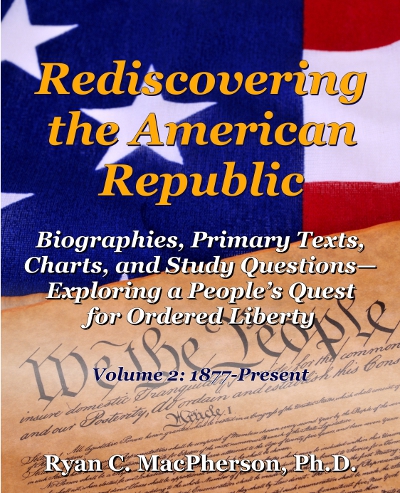Anxiety has taken hold of most American voters this Election Day: some because they want anyone but her to be elected president; others because they want anyone but him. I do not mean to trivialize the momentous decision that lies before the American people on the 2016 ballot, but I do think that the anxiety of both the Republicans and the Democrats has been misplaced. If the fate of our nation hinges upon one person being elected for one term to one office, then something has gone drastically wrong somewhere other than 1600 Pennsylvania Avenue, District of Columbia.
On Chestnut Street in Philadelphia, during the summer of 1787, the framers of the U.S. Constitution worked hard to ensure that in the United States of America no one person would wield too much power for too long of a time. Therefore, they divided the government into many offices. They also knew that no one person, not even a group of people, had enough virtue to be trusted simultaneously with legislative, executive, and judicial powers. Therefore, they separated those powers into three distinct branches of government. They did so boldly. For example, never before in history had any government been established with a supreme court in a branch distinct from both the executive and the legislature. Furthermore, the framers debated and compromised on where to draw the line between federal authority, state authority, and the rights reserved to the people themselves. The Constitution itself did not satisfactorily address the principles of republicanism and federalism, and so the states in short order ratified ten amendments, which became known as the Bill of Rights.
During the same summer that the framers convened in Philadelphia, the still-functioning federal congress, as authorized under the Articles of Confederation which preceded the U.S. Constitution, enacted the Northwest Land Ordinance, which stated in Sec. 14, art. 3:
Religion, morality, and knowledge, being necessary to good government and the happiness of mankind, schools and the means of education shall forever be encouraged.”
As Dr. Benjamin Rush, a signer of the Declaration of Independence, observed, “Religion is necessary to correct the effects of learning. Without religion I believe learning does real mischief to the morals and principles of mankind.” John Adams, during his term as the nation’s second president, similarly reflected, “Our Constitution was made only for a moral and religious people. It is wholly inadequate to the government of any other.” A generation later, Alexis de Tocqueville visited America, astounded that whereas democracy had failed in France it was still running strong in America. Writing his 2-volume Democracy in America to account for that difference, Tocqueville concluded that religion (Christianity in particular) promotes the moral virtues that a democratic republic requires for its preservation.
Over time, however, the American people became less religious, less moral, and less knowledgeable. They failed to pass to their children the three attributes of character identified in the Northwest Land Ordinance as “being necessary to good government and the happiness of mankind.” The schools funded and regulated by the government taught less and less religion (the Supreme Court even declared religious instruction unconstitutional), less and less morality (in the sense understood by the congressmen of 1787), and less and less knowledge. Case in point: a century and a half ago, a student had to pass an exam in Latin just to get admitted to college; nowadays, a person can graduate from many colleges without ever studying any foreign language. Thanks to computers in the classroom (your tax dollars at work), today’s students have more information than all of their ancestors combined; sadly, however, they have far less understanding.
The people’s knowledge of the Constitution under which their natural rights are protected is pathetic. Don’t believe me? Just ask your neighbor how many Supreme Court justices there are, what are the names of both senators from your state, which portion of the government has the authority to declare war, or which amendment to the Constitution guarantees a right to abortion. (Caution: That last one was a trick question. Not even the prevailing justices in Roe v. Wade could agree among themselves from which clauses in the Constitution to draw the inference that such a right might exist.)
With the decline in religion, morality, and knowledge has come a parallel decline in the nation’s republican character (lowercased r, referring to a form of government in which locally elected representatives are charged with the responsibility of protecting the people’s inalienable rights to life, liberty, and property). The deep anxiety that Americans feel this Election Day stems not simply from fears concerning who will be inaugurated as president in January, but also from the realizations that Congress may fail to check the President, that the Supreme Court may fail to check Congress, and that state officers may fail to check the federal government. In other words, people fear that the election of a unscrupulous person as president will be far more portending than the framers of the Constitution ever meant it to be. People fear tyranny, and those who do understand their Constitution no longer have confidence that the checks and balances built into the American Republic will secure their liberties.
I am not alarmed that people fear tyranny; I would be more alarmed if they did not. But I am alarmed that they no longer have confidence in the constitutional order itself. Even so, I continue to hear in Jefferson’s words the clear ring of truth: “government derives its just powers from the consent of the governed.” The next administration will be no more ominous than the people permit. The people retain tremendous power in the ballot box, on the editorial page, and on the sidewalks outside of 1600 Pennsylvania Avenue and along the Capitol Mall. As jurors, the people can block the implementation of a bad law that would convict the innocent. As neighbors, they can encourage their local magistrates to interpose against an unconstitutional policy. The sooner the people make full use of their lawful means, the less they will be tempted to make use of unlawful means. But those who sit around and do nothing for another four years may instead discover that they’ve lost their chance.
What if, for example, November 8, 2016, goes down in history as the nation’s last presidential election? If you think the choice among this year’s candidates is depressing, are you willing to wait until you have no choice at all? Or will you make full use of the means now available to restore and preserve your nation—not just on Election Day, but every day of the year?
Dr. Ryan C. MacPherson is the founding president of Into Your Hands LLC and the author of several books, including Rediscovering the American Republic (2 vols.) and Debating Evolution before Darwinism. He lives with his wife Marie and their homeschooled children in Casper, Wyoming, where he serves as Academic Dean at Luther Classical College. He previously taught American history, history of science, and bioethics at Bethany Lutheran College, 2003–2023 He also serves as President of the Hausvater Project, which mentors Christian parents. For more information, visit www.ryancmacpherson.com.


